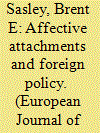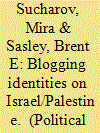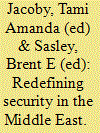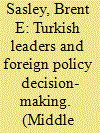|
|
|
Sort Order |
|
|
|
Items / Page
|
|
|
|
|
|
|
| Srl | Item |
| 1 |
ID:
101385


|
|
|
|
|
| Publication |
2010.
|
| Summary/Abstract |
Although the important role of emotions in decision-making has been highlighted in the psychology, neural science, and decision research literatures, this conclusion has not been widely adopted in foreign policy analysis and International Relations (IR). Of the work that has been done, much of it has been focused on public perceptions and the impact on foreign policy, but not on elites and the actual decisions of foreign policy. This article seeks to address this imbalance by examining the role of one element of emotion - affect - on key foreign policy decision-makers. It argues that the greater the emotional attachment a leader has to an object, the less flexible she is in foreign policy toward that object. The model is used to explain a critical puzzle in IR: Israel's decision to pursue and sign the 1993 Oslo Accords.
|
|
|
|
|
|
|
|
|
|
|
|
|
|
|
|
| 2 |
ID:
131557


|
|
|
|
|
| Publication |
2014.
|
| Summary/Abstract |
Drawing on our research and blogging on Israel and the Israeli-Palestinian conflict, we make three claims about the role of scholar-bloggers in the social media age. First, as scholar-bloggers with some degree of ethno-national attachments related to our area of expertise, we contend that we are well positioned to issue the kinds of critiques that may resonate more deeply due to the very subjectivity that some perceive as a liability. Second, through the melding of scholarly arguments with popular writing forms, scholar-bloggers are uniquely poised to be at the forefront of public engagement and political literacy both with social media publics and with students. Third, the subjectivity hazard is an intrinsic part of any type of research and writing, whether that writing is aimed at a scholarly audience or any other, and should not be used as an argument against academic involvement in social media. Ultimately, subjectivities of both consumers and producers can evolve through these highly interactive media, a dynamic that deserves further examination.
|
|
|
|
|
|
|
|
|
|
|
|
|
|
|
|
| 3 |
ID:
046300


|
|
|
|
|
| Publication |
Manchester, Manchester University Press, 2002.
|
| Description |
ix, 176p.
|
| Standard Number |
0719062330
|
|
|
|
|
|
|
|
|
|
|
|
Copies: C:1/I:0,R:0,Q:0
Circulation
| Accession# | Call# | Current Location | Status | Policy | Location |
| 046220 | 355.033056/JAC 046220 | Main | On Shelf | General | |
|
|
|
|
| 4 |
ID:
095642


|
|
|
|
|
| Publication |
2010.
|
| Summary/Abstract |
Instead of always teaching students how to succeed-as is the norm in higher education-it might also be useful to teach them about failure. Understanding failure (that is, why actors fail to reach common objectives in inter-group settings) gives students deeper insight into how to resolve global problems, and the conditions under which success can be achieved. This enhances student awareness of complexity in world affairs, including the nature of inter-group relations. Simulations are a good way to teach students about the possibility of failure, and how to learn from it, because they allow students to go through the learning process on their own. In this article I discuss how a simulation I ran on Middle Eastern politics can be used as an example of how to instruct students about failure as much as about success.
|
|
|
|
|
|
|
|
|
|
|
|
|
|
|
|
| 5 |
ID:
108035


|
|
|
|
|
| Publication |
2011.
|
| Summary/Abstract |
This article starts from the assumption that emotions are inherently part of life in the international system, but that this is not as well reflected in the discipline of International Relations. The study of emotions can be incorporated more systematically into the discipline through more rigorous theorizing about how states-as main actors in world politics-experience and act on emotions. To do so, I draw on intergroup emotions theory, an emerging area of research in social psychology. This approach points out the process by which groups come to have emotional reactions, and from there how emotions generate intergroup perceptions and intergroup behavior-or foreign policies in the case of states. Understanding states-as-groups addresses many of the criticisms mainstream IR scholars direct toward the study of emotions, including how individual-level factors such as emotions matter for intergroup relationships.
|
|
|
|
|
|
|
|
|
|
|
|
|
|
|
|
| 6 |
ID:
114260


|
|
|
|
|
| Publication |
2012.
|
| Summary/Abstract |
This article seeks to contribute to our understanding of Turkish foreign policymaking, which is an under-developed area of study. It does so by examining the role of individual leaders in the foreign policymaking process. It compares two Islamist prime ministers - Necmettin Erbakan and Recep Tayyip Erdogan - and the difference in their levels of emotional attachment to Islam and their pragmatism. The findings are also relevant for a more informed understanding of the potential outcomes of the revolutions in the Arab world, where attention to Islamist groups and their preferences have become paramount.
|
|
|
|
|
|
|
|
|
|
|
|
|
|
|
|
|
|
|
|
|